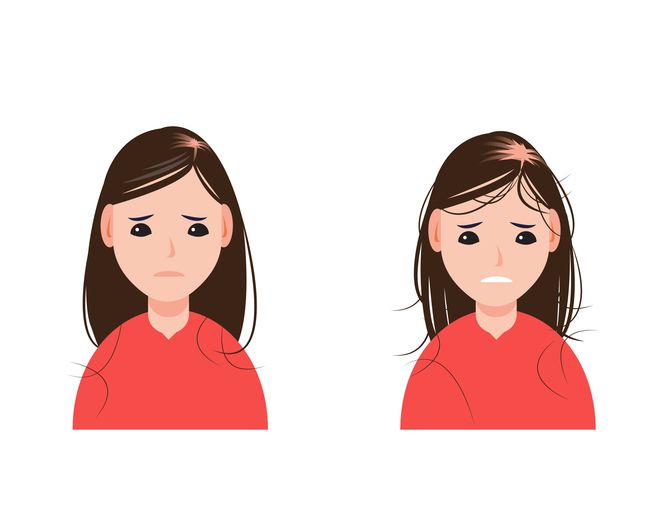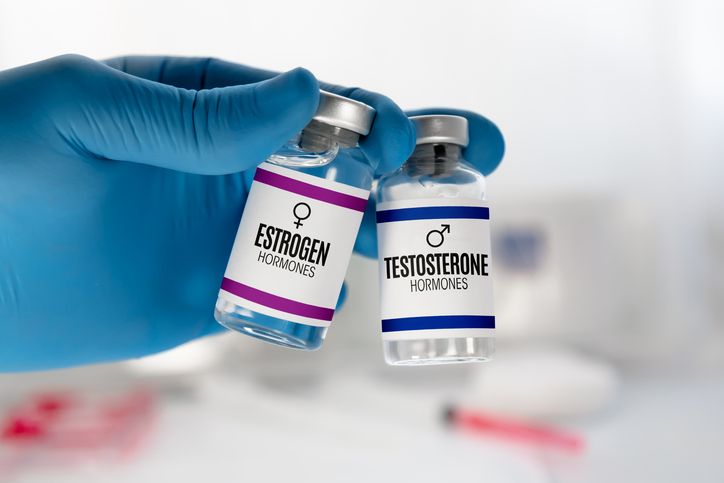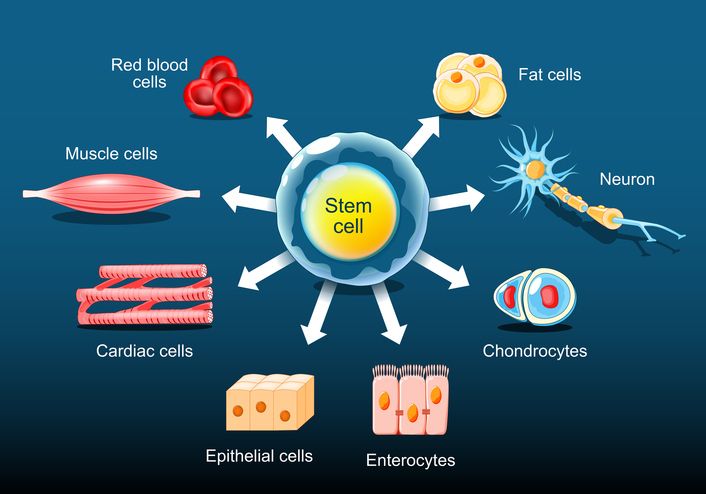Author: Natalie Ng|Updated: 29 April 2025
Your hormones play a big role in how and where your hair grows. They act like messengers that tell your body what to do — including how much body hair you have and where it shows up. Hormones like testosterone and DHT (dihydrotestosterone) can increase body hair and facial hair growth, especially in places like the upper lip, chest, or back. Estrogen, on the other hand, helps keep the hair on your head healthy but usually reduces body hair. These hormone signals travel through your bloodstream and connect with hair follicle cells all over your body. That’s why hair grows differently in different areas — and why some people see more body hair than others. Your hormone levels, genetic factors, and health conditions all affect hair growth. Understanding this connection can help explain things like excess hair growth, thinning hair, or why new hair growth might show up in places you didn’t expect. It can also help make sense of common issues like hair loss, unwanted hair, or changes linked to birth control pills, polycystic ovary syndrome (PCOS), or a hormonal disorder. If you’ve ever wondered why your body hair changes — or why you're noticing increased body hair or darker, thicker facial hair — keep reading. This article breaks down the basics of how your hormones affect hair growth, what’s normal, and what might point to an underlying condition.

The Science Behind Hormonal Hair Growth Control

How Hormones Affect Hair Follicles Across the Body
Hormones directly affect how hair grows by interacting with hair follicle cells in different body areas. Androgens — such as testosterone and DHT — are the main hormones responsible for body hair growth and facial hair growth. These male hormones attach to receptors in the hair follicles and trigger thicker, darker hair in areas like the chest, upper lip, back, or pubic area.
Androgens and Body Hair Growth
Higher androgen levels can lead to more body hair or excess body hair growth. For example, people assigned female at birth may notice increased facial hair or excessive body hair if their bodies produce more androgens than usual. This can happen due to certain medical conditions, such as polycystic ovary syndrome (PCOS), or as a side effect of anabolic steroids.
Estrogen’s Role in Hair Health
Estrogen works differently. It helps hair on your head grow and stay healthy, while often reducing hair growth on the body. People with higher estrogen levels may have less body hair and slower facial hair growth. This is one reason why hormonal changes, like those caused by birth control pills or menopause, can affect hair growth and hair loss.
Hair Follicle Sensitivity Differs by Body Area
Hair follicles don’t all react the same way to hormones. Some body areas have hair follicles that are more sensitive to androgens. This is why you might grow thicker terminal hair in one area but barely notice any growth in another. These differences help explain why excessive growth or hair thinning happens unevenly across the body.
Understanding these patterns is important if you're seeing excess hair, unwanted hair, or thinning hair. It helps connect the dots between hormone levels and hair changes — and may point to a possible underlying condition.

Key Hormones Affecting Hair Development

Several hormones influence how and where hair grows on your body. Each one plays a specific role in either supporting or slowing down hair growth. These effects depend on your hormone levels, how sensitive your hair follicles are, and whether any health conditions are involved. Understanding which hormones affect hair can help explain changes like excess body hair growth, facial hair growth, or hair thinning.
Testosterone – Stimulates Body and Facial Hair
Testosterone is an androgen, a group of hormones often linked with male traits. It increases body hair growth and facial hair growth, especially during puberty. Higher levels of testosterone can lead to more visible hair in areas like the chest, arms, back, and upper lip. In people assigned female at birth, increased testosterone can lead to excessive body hair or dark hair in areas that usually have fine or less noticeable hair. This condition is called hirsutism and is often a sign of a hormonal imbalance or an underlying condition like polycystic ovary syndrome (PCOS).
Estrogen – Supports Scalp Hair and Reduces Body Hair
Estrogen plays a key role in hair growth on the scalp. It helps hair stay in the growing phase longer, which reduces hair loss and encourages new hair growth. At the same time, higher estrogen levels often limit body hair growth. This is why many women have less body hair compared to men. When estrogen levels drop — such as during menopause — people may notice thinning hair on the scalp and increased facial hair growth, especially on the chin or upper lip.
DHT (Dihydrotestosterone) – Linked to Hair Loss and Growth Patterns
DHT is made from testosterone in the body. It has a strong effect on hair follicles. In some people, DHT shrinks the follicles on the scalp, which causes hair to thin and fall out — a pattern often seen in hormonal hair loss. At the same time, DHT can increase terminal hair growth in areas like the back, chest, and face. High levels of DHT are often associated with both hair loss on the head and excess body hair growth.
These hormone-driven changes are not always easy to spot at first, but they can shape how hair grows in different areas of your body over time. If you're dealing with excessive growth, unwanted hair, or hair thinning, hormone levels may be part of the reason — and identifying which ones are involved is the first step in creating a clear treatment plan.
Book Now to Experience
IPL Hair Removal Treatment
1 Minute Self-Registration
Date should not be before minimal date

Common Hair Growth Changes During Hormonal Shifts

Hormonal shifts can lead to noticeable changes in body hair growth. These changes are common during major life stages like puberty, pregnancy, and menopause. Hormones affect hair follicle activity in different ways, depending on your age, sex, and overall hormonal balance. Each phase can cause new hair to grow, hair to shed, or hair to change in texture and thickness.
Puberty
During puberty, androgen levels rise, especially testosterone. This triggers new hair growth in areas like the underarms, pubic area, legs, and face. For many women, this is also when they first notice darker hair or new body hair in places like the upper lip or stomach. In some cases, puberty can reveal a hormonal disorder if hair grows in a pattern more typical of male hormone levels.
Pregnancy
Pregnancy causes sharp increases in estrogen and progesterone. These hormones often extend the growth phase of hair, leading to fuller and thicker hair on the head. At the same time, increased blood volume and nutrient absorption can improve hair health overall. But some people also notice excess hair growth in new body areas, including the face, chest, or abdomen. These changes are temporary and often go away after birth.
Menopause
During menopause, estrogen levels drop and androgen levels may stay the same or even rise. This shift often causes scalp hair thinning and, at the same time, increased facial hair growth. Many women notice more hair on the chin, upper lip, or jawline. These changes are caused by the reduced influence of estrogen and the stronger effects of male hormones on hair follicles.
Understanding how your body reacts during these stages can help you track changes in your hair growth patterns. It also helps when discussing symptoms with your healthcare provider, especially if you suspect a hormonal imbalance or underlying condition.

Lifestyle Factors That Impact Hormonal Hair Growth

Your lifestyle choices can affect how your hormones behave — and that includes how your hair grows. What you eat, how you sleep, and how you manage stress all play a role in your hormonal balance. These everyday habits influence hormone production and can either support or disrupt the way your body hair grows.
Diet and Nutrition
A well-balanced diet supports healthy hormone levels. Your body needs key nutrients to produce and regulate hormones that affect hair growth. Protein helps build the structure of new hair. Healthy fats support hormone production, while vitamins like B and E help protect hair follicle cells and keep them working properly.
Foods like leafy greens, nuts, seeds, eggs, and oily fish can support steady hair growth and reduce the risk of thinning hair or excess body hair growth caused by imbalances. Diets low in nutrients or too high in processed foods can lead to hormonal issues that affect hair follicles and result in unwanted hair growth or hair loss.
Sleep and Hormone Regulation
Sleep is essential for hormone balance. Your body regulates hormones like testosterone and cortisol while you sleep. Poor or irregular sleep can lead to higher levels of stress hormones, which may increase DHT production. This can cause more facial hair growth and possibly contribute to hair thinning on your scalp.
Getting 7–9 hours of quality sleep each night helps keep your hormone levels stable, which supports normal hair growth patterns and reduces the chance of excess body hair or hair loss.
Stress and Hormonal Response
Chronic stress affects your adrenal gland, which secretes hormones like cortisol and affects other hormone systems in the body. High stress can increase androgen activity, potentially causing excess facial hair growth and changes in hair texture or thickness.
While extreme stress can lead to hair shedding (known as telogen effluvium), ongoing stress may also worsen hormonal disorders that affect hair, such as PCOS. Managing stress through regular physical activity, social support, or mindfulness techniques can help stabilize hormone levels and reduce hair growth changes.
Your daily routine has a bigger effect on hair than most people realize. Paying attention to these factors can help support healthy hormone function and reduce unwanted changes in your hair growth patterns.
Book Now to Experience
IPL Hair Removal Treatment
1 Minute Self-Registration
Date should not be before minimal date

Treatment Options for Hormone-Related Hair Issues

If lifestyle changes aren’t enough to manage hormone-related hair concerns, there are medical and cosmetic treatments that can help. The right treatment depends on what’s causing the hair changes — whether it’s excess hair growth, facial hair, or hair thinning. A healthcare provider can use your medical history, symptoms, and sometimes a blood test to check your hormone levels and suggest a treatment plan that fits your needs.
Medications
Certain medications help control hormone levels or block the effects of specific hormones on hair follicles:
• Anti-androgens like spironolactone reduce excess hair growth by limiting the impact of male hormones on hair follicles. This can be helpful for people with excessive facial hair or unwanted hair in hormone-sensitive areas.
• Finasteride blocks DHT and can slow down hair loss, especially in people with androgen-related thinning hair.
• Minoxidil helps stimulate new hair growth on the scalp. It’s often used for thinning hair caused by hormonal shifts like menopause or telogen effluvium.
These treatments may take several sessions or months to show results, and they’re often used along with lifestyle changes for better long-term outcomes.
Natural Supplements
Some people prefer natural remedies to support hormonal balance:
• Saw palmetto may reduce DHT activity and help with both hair thinning and excess hair growth.
• Spearmint tea has anti-androgen effects that may reduce facial hair in women with high testosterone levels.
• Evening primrose oil may help with hormonal fluctuations, especially during menopause or PMS.
While natural supplements can support hair health, it's important to speak with a healthcare provider before using them — especially if you're managing a hormonal disorder.

IPL Hair Removal Treatment: Gentle Support for Hormone-Related Excess Hair Growth
Hormonal imbalances — especially those involving testosterone, DHT, or androgen levels — can lead to excessive body hair growth in areas like the upper lip, chin, arms, legs, and pubic area. This is common in people with conditions like PCOS, adrenal hyperplasia, or after changes triggered by birth control pills or other hormonal shifts. For those seeking a non-invasive way to manage unwanted hair caused by hormone-related changes, the IPL Hair Removal Treatment offers a reliable and skin-friendly option.
How the IPL Hair Removal Treatment Works
The IPL (Intense Pulsed Light) treatment uses light-based energy to target melanin in the hair shaft. When the light reaches the hair follicles, the absorbed heat damages the follicle structure and shrinks the blood capillaries that feed the hair root. This reduces the follicle’s ability to support new hair growth — especially effective in hormone-sensitive body areas where excess terminal hair can develop due to hormonal changes.
A key feature of the IPL handpiece is its sapphire cooling tip, which releases cold energy to calm the skin during treatment. This reduces irritation and makes the experience more comfortable — ideal for sensitive skin or those experiencing excessive body hair from hormonal conditions.
Benefits for Hormone-Induced Hair Growth
• Targets coarse and fine hair in areas affected by hormonal shifts
• Breaks down melanin buildup caused by frequent shaving or friction
• Reduces future hair growth by weakening the follicles from the root
• Improves skin texture, especially in areas where hormonal hair growth has caused darkening or roughness
• Soothes skin during the procedure with integrated cooling, minimizing redness or discomfort
• Non-invasive and safe for most skin types with no downtime needed
Unlike temporary methods like waxing or shaving, IPL focuses on the source of excess hair — the hair follicle. Over a full treatment course, hair becomes thinner, lighter, and grows back more slowly until it eventually stops.
For many women dealing with excess facial hair, increased body hair, or unwanted hair triggered by hormonal changes, IPL provides a comfortable and effective solution that supports smoother skin and lasting results.
Book your IPL Hair Removal Treatment today and take the first step toward smooth, hair-free skin — safely and effectively.
New Beauty's IPL Hair Removal TreatmentBook Now to Experience
IPL Hair Removal Treatment
1 Minute Self-Registration
Date should not be before minimal date
FAQ
Can Birth Control Medications Permanently Alter Natural Body Hair Growth Patterns?
Birth control won't permanently change your body hair growth patterns. While you're taking hormonal contraceptives, you might notice some changes like reduced hair growth or thinning in certain areas. These effects happen because the medications alter your hormone levels, particularly androgens. Once you stop taking birth control, your natural hair growth patterns will typically return to normal within a few months.
Why Do Some People Experience More Facial Hair Growth During Pregnancy?
During pregnancy, you'll discover your body becoming a powerhouse of hormonal changes, especially with androgens going absolutely wild! These pregnancy hormones, particularly testosterone, don't hold back - they'll boost your facial hair growth like never before. You're experiencing your body's natural, empowering process as it creates new life. Don't worry, you're beautifully transforming, and most of these changes aren't permanent.
Do Genetic Factors Influence How Hormones Affect Individual Hair Growth?
Your genes play a major role in how your body responds to hormones that control hair growth. You'll inherit specific hormone receptor patterns that determine your sensitivity to androgens and other growth-regulating hormones. That's why you might notice different hair growth patterns than your friends, even with similar hormone levels. These genetic variations can affect everything from your facial hair density to body hair distribution.
At What Age Do Hormone-Related Changes in Body Hair Typically Stop?
Your body's hormone-related hair changes typically stabilize in your mid-20s, though you'll experience ongoing subtle shifts throughout life. You'll notice most dramatic changes during puberty until around age 25. However, you're not bound by these typical timelines - factors like pregnancy, medication, or health conditions can trigger new hair growth patterns at any age. Your unique hormonal journey might differ from these general patterns.
Can Stress-Induced Hormonal Changes Cause Permanent Hair Growth Alterations?
Like a domino effect rippling through your body, stress can indeed trigger hormonal changes that affect your hair growth patterns. While temporary stress typically won't cause permanent changes, chronic, long-term stress might leave a lasting mark on your hair growth. You'll notice this most commonly through increased hair growth in unwanted areas or hair loss on your scalp. However, you can often reverse these changes by managing your stress levels.
Recommended Articles
COPYRIGHT© NEW BEAUTY MANAGEMENT LIMITED 2026. ALL RIGHT RESERVED.




